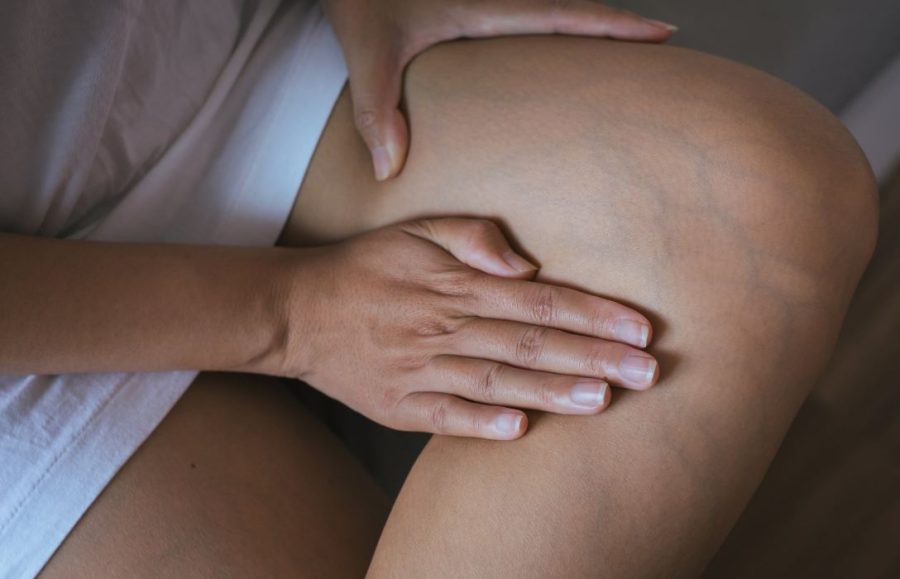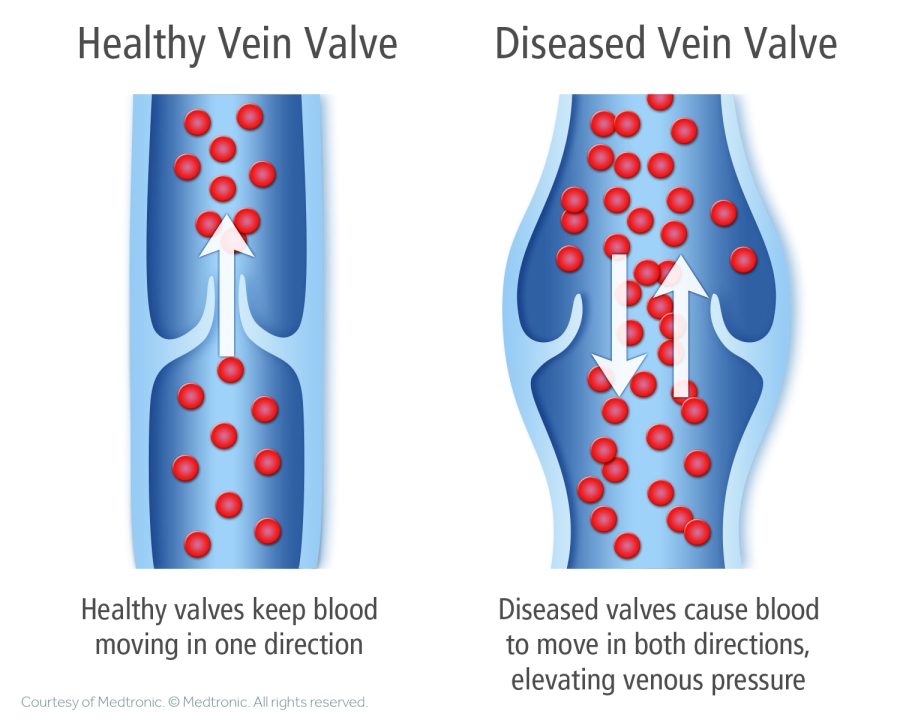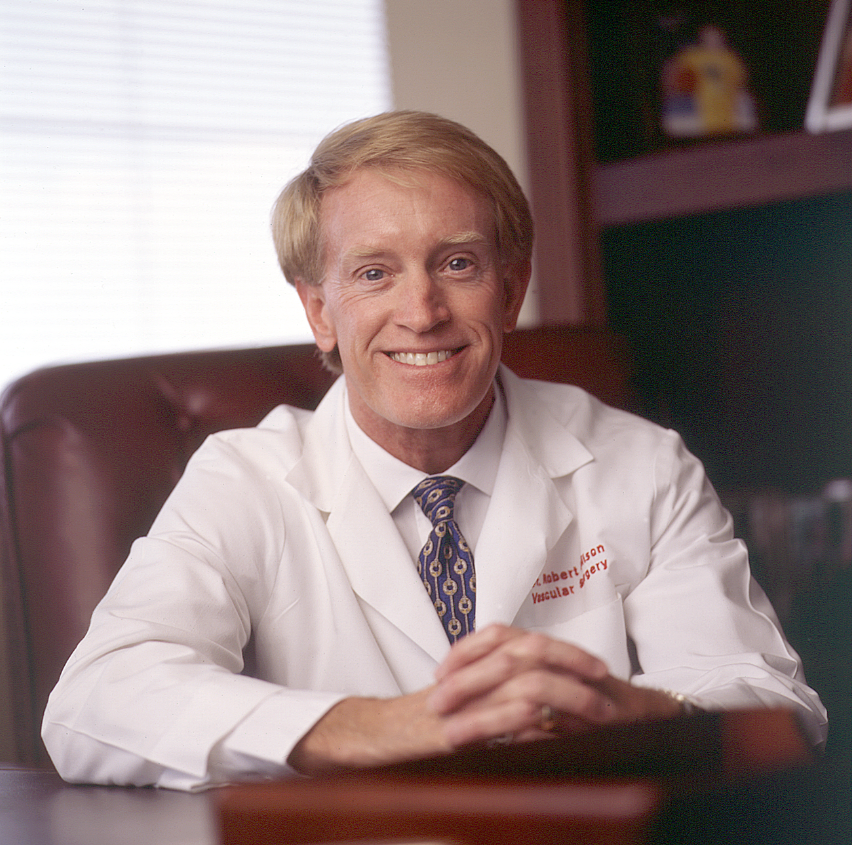
Many women wonder why during pregnancy, and even after pregnancy, they develop blue or purple bulgy veins, known as varicose veins, on their legs.
Varicose veins are the result of faulty valves within your superficial vein system. Veins carry blood from the lower extremities back to the heart. Normally, the blood will flow one way and the veins have valves that prevent the blood from flowing backward. However, during pregnancy, these valves can become weak and eventually allow blood to pool in the veins.
Pregnancy is one of the main risk factors for developing varicose veins. This is due to a number of reasons:
- Your blood volume increases during pregnancy, putting more pressure on your veins.
- Hormonal changes occur, such as increased progesterone levels, causing the veins to
open and relax. - Your uterus can put pressure on the veins in the lower abdomen, slowing blood flow
back to the heart. - The extra weight gained during pregnancy can also put pressure on your veins.
Generally, varicose veins improve after giving birth, but there are a few measures you can take during pregnancy to find relief:
- Wear compression stockings. We generally recommend choosing 20-30mmHg thigh-high stockings.
- Avoid sitting or standing for long periods of time.
- Get regular exercise (with your doctor’s approval).
- Drink lots of water.
If your varicose veins are still a concern after pregnancy, treatment might be the next step for you. Most women are surprised to hear that they can receive treatment even while breastfeeding. However, we do recommend waiting at least three months after giving birth before starting treatment.
Seeking Varicose Vein Treatment
First, you should have your legs evaluated by a vascular surgeon to determine the underlying cause of your varicose veins. During the evaluation, a registered vascular technologist will scan your legs with an ultrasound to check for venous reflux. This will help the surgeon provide guidance on the best treatment option for your individual case. Modern treatments are minimally invasive and are performed in an office setting with little-to-no downtime.
 A common treatment choice for patients is Endovenous Laser or Radiofrequency Ablation. This minimally invasive surgical procedure shuts down the underlying faulty vein, typically the Great Saphenous or Short Saphenous Vein, that is feeding the varicose veins.
A common treatment choice for patients is Endovenous Laser or Radiofrequency Ablation. This minimally invasive surgical procedure shuts down the underlying faulty vein, typically the Great Saphenous or Short Saphenous Vein, that is feeding the varicose veins.
After treating underlying vein issues, the surface veins can then be addressed. Treatments such as an Ambulatory Phlebectomy or Sclerotherapy can help patients achieve the best cosmetic outcome. An Ambulatory Phlebectomy refers to the removal of superficial veins through tiny incisions in the skin. Sclerotherapy involves injecting the vein with a solution to collapse it.
The bottom line is that varicose veins are more than just a cosmetic concern. If left untreated, they can progress and cause uncomfortable symptoms for patients, such as achy legs, itchiness, burning sensations, swelling, and even restless legs. Pregnancy and the years after should be an enjoyable time without the worry or embarrassment of varicose veins.
The good news is that most insurance companies will cover treatment that is medically
necessary. That is why it is important for you to have an evaluation by a vascular surgeon who can properly evaluate your legs and diagnose the underlying cause.
JM Reader Offer!
Mention Jacksonville Mom when you schedule an appointment at Ellison Vein Institute to receive a special moms-only gift bag at consultation.

About the Author
Dr. Robert Ellison, MD – Vascular Surgeon at the Ellison Vein Institute is a specialist in vascular surgery and a recognized expert in the diagnosis and treatment of varicose veins. Certified by the American Board of Surgery, Dr. Ellison has been practicing vascular surgery in private practice in Jacksonville since 1986. Dr. Ellison also is a wound-care specialist, with expertise in treating ulceration and other skin problems associated with varicose veins. Dr. Ellison has many years of experience with sclerotherapy, as well as major surgical and laser techniques for treating varicose veins. He is a graduate of the University of Georgia and the Medical College of Georgia, and he completed a fellowship in vascular surgery at Georgia Baptist Hospital in Atlanta. Dr. Ellison is a member of The American Board of Surgery, Florida Vascular Society, the Society for Clinical Vascular Surgery, the American College of Phlebology, Jacksonville Vascular Society, The Peripheral Vascular Surgery Society, the Society of Vascular Surgery, the American Venous Forum, and is a Fellow of the American College of Surgeons.
















